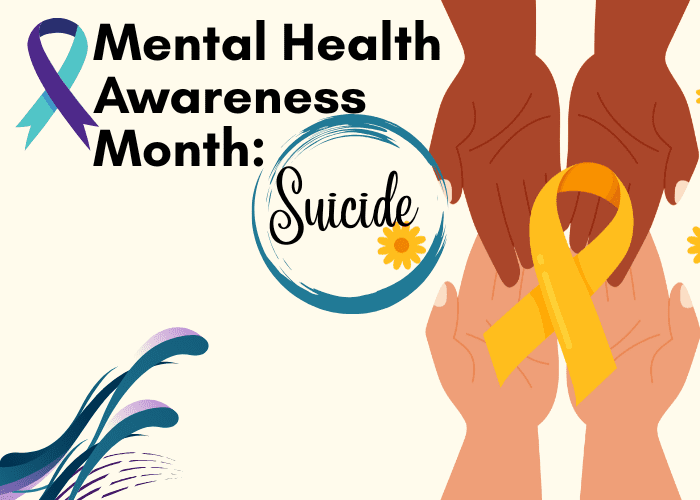
An important aspect of mental health awareness, which the month of May is dedicated to, is the subject of suicide. It’s an uncomfortable topic that many people don’t want to talk about. Many people just don’t know how to talk about it. Others believe a lot of myths about suicide. Hopefully, this blog post can help demystify the topic and help you gain a little more comfort with talking about it.
What Causes Suicide?
There is no one contributor to suicidal ideation in an individual. There is also no one contributor that causes someone to attempt or complete suicide. Common things that people experience that lead them to suicidal ideation can be mental health disorders, stressful life events, substance use, and chronic stress.
Certain mental health disorders are more commonly associated with suicidal ideation than others. Major depressive disorder, bipolar disorder, post-traumatic stress disorder, eating disorders, schizophrenia and related disorders, and some personality disorders have higher suicide rates. Also, certain demographics are at higher risk of suicide, such as those with severe, chronic illnesses or those in the LGBTQIA+ community.
What Are Common Common Myths?
One of the biggest myths about suicide revolves around talking to people who are suicidal. Many people think if they ask someone about their suicidal ideation that it will push them or encourage them to make an attempt. The research shows that this is patently not true. Being given an opportunity to openly talk about their suicidal ideations without judgement can really help a suicidal person. Many times, they just need someone to talk to who will understand them. Avoiding the topic makes it seem like a dirty topic or something shameful. This can actually contribute to suicide attempts for many people.
Another common myth is that you can “tell” when someone is suicidal. And while there are some common tells for people (such as giving many of their possessions away, trying to suddenly make amends for wrongs in the past, extreme social isolation, etc.) there are just as many people who attempt or complete suicide without any “warning”. Often, these are people who are either very good at masking their troubles or have been struggling for so long that the people around them have become habituated.
How Can We Prevent Suicide?
There are many suicide crisis lines that are available online. One of the largest is texting or calling 988, which is a 24/7 crisis prevention hotline. There is also a line specific for US Veterans (Veterans Crisis Line). The Trevor Project is another resource for individuals who are actively in crisis.
Proper mental health care is also essential. Speaking to a therapist, taking prescribed medication as indicated, and keeping track of triggers for suicidal ideation are important aspects to preventing suicide.
Individuals can also go to their local emergency room if they are in crisis.
Another important aspect is being more open to talking about mental health struggles. Someone who feels less alone is more likely to come out about their suicidal ideation which can then help them find the proper resources.



